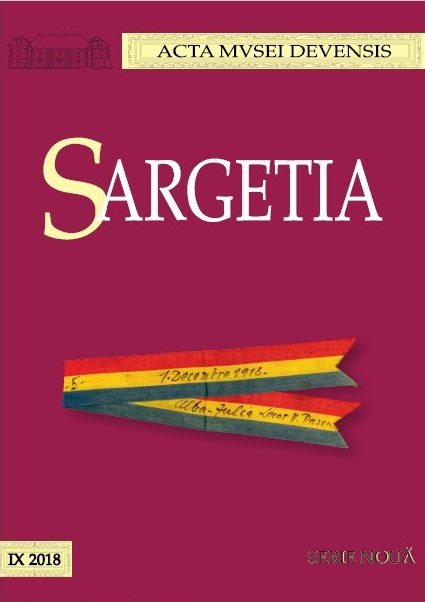Făuritorii României Mari – evocare la Centenar. Destinul membrilor Cercului Profesional Militar al Partidului Naţional Țărănesc
Creators of Great Romania – Remembrance at Centenary. The Destiny of Members of Military Professional Section of the National Peasant Party
Author(s): Corneliu BeldimanSubject(s): History, Recent History (1900 till today), Pre-WW I & WW I (1900 -1919), Interwar Period (1920 - 1939), WW II and following years (1940 - 1949)
Published by: Editura Altip
Keywords: Communist repression; Gabriel Negrei; war hero generals; Military Professional Section of the National Peasant Party; Vasile Zorzor;
Summary/Abstract: After the 6th of March 1945, one of the main directions of the Communist governors was rapid and complete destruction of Romanian Royal Army and its replacement with “The Popular Army”, instrument that was compulsory in implementing the “regime of popular democracy” which was closely supervised by the Soviets. Step by step, taking advantage of the content of Armistice Convention and Peace Treaty of Paris, Petru Groza’s Government intensively launched the campaign (which was anterior begun) of suspending the officers and NCOs from Romanian Royal Army. These were actually political purges. Between May 1945 – May 1948, about 2/3 of the military forces which had been in charge at the end of war were released from the army due to political or other non-legal reasons. From a statistical point of view, this process meant dismissing of 32.000 military forces (officers and NCOs).The suspended officers and NCOs grouped and protested, in an organised manner, against the abusive measures applied by the Communist regime in the army and asked for their reinstatement in legal rights. In this context, the opposition parties (especially National Peasant Party) intensified the efforts to attract in their organizations the retired militaries, the dismissed ones and even those from active forces. Thus, we may observe a phenomenon of an unprecedented increase of military members of opposition parties. This fact had important consequences on the activities of the political parties. At the same time, the regime targeted the development of the phenomenon and waited for the right moment to apply measures for its annihilation.According to Iuliu Maniu’s testimony at the political process from October-November 1947, the Section of Military Studies and Documentation (briefly, the Military Section) of National Peasant Party was founded in 1926. The works elaborated by this professional commission of the party proved to be extremely useful for re-organisation of the Romanian Royal Army since 1928 when the National Peasant Party became a governmental party.According to the Statute of the National Peasant Party from 1935, besides the political organization, there were auxiliary organisms (professional sections being among them) whose aim was to train their members in specific domains of activities according to party’s program. These professional sections officially existed since 1938.In October 1946, a leading committee comprising 10 members was elected: general Gabriel Negrei (president); col. Ştefan Stoika (senior vice president); generals Vasile Barbu, Vasile Zorzor and Grigore Stoika (vice presidents). At that time, in Romania, there were 2800 officers registered in military sections of the party. Among these 60% were suspended, 30% retired and 10% in charge.General Negrei synthetized the role and the importance of the Military Section and later on Military Professional Section of the National Peasant Party: this “[…] comprises a large part of the reserve officers which represent the base for a future army and our nation force. National Peasant Party is interested (not only from an elective point of view) in bringing together as many as possible of these disciplined people, with the experience of the two wars, with an homogenous moral and technical knowledge from various fields, to initiate them in democratic ideology of the right time, of the peasants’ state and not to let them to be influenced by extremist ideas. Among them there are mature veterans, but also young officers and inferior ranks from army. Some of them, due to their ideas, could be part of the Section for Studies and others could be enrolled in professional section because of their executive roles. Due to these characteristics, the Military Professional Section is different from other sections of unique specialisation; some of its members have various specialties such as military, strategy and tactics, technical, aviation, industry, teachers, administration, doctors, economists, lawyers etc. Such energies and skills should not be neglected (as it has been until now) because they are available due to the fact that most of these people do not have exhausting occupations; thus, the state should use them, as it was done in Germany, where people suspended from army were activated in functions and consequently there were no dissatisfied, broken down people, with no possibility to earn a living […]”.Leaders of the Military Professional Section were arrested by Communist authorities and investigated for political reasons at Ministry of Internal Affairs. In May 1948, they were sued in the “Group of Witnesses” within the trial of the National Peasant Party leaders at the Bucharest Military Tribunal and sentenced to years of rigorous detention for “conspiracy for rebellion”.Among them we make a special mention for Brigade General (Artillery) Gabriel Negrei and Brigade General (Gendarmerie) Vasile Zorzor, died in prison, being subjected to an extermination regime. Outstanding figures of Romanian career soldiers for the first half of the 20th century they reached the top of military hierarchy through hard work, respect of law and exemplary moral conduct. In the dramatic context of the instauration of the Communist regime in Romania, their life was of an emblematic tragic specific for those hard times. Gen. Gabriel Negrei and Gen. Vasile Zorzor, colleagues at the Military Professional Section of the National Peasant Party, have been among Romanian generals, war heroes and creators of the Great Romanian Union in 1918 on the battlefield. The remembrance of these elite figures is a duty 70 years from the trial the and in the anniversary context of the Centenary of Great Romania.
Journal: Sargetia. Acta Musei Devensis
- Issue Year: 2018
- Issue No: 9
- Page Range: 279-294
- Page Count: 16
- Language: Romanian

